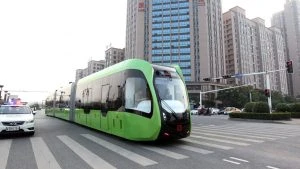China’s Automotive Targets

Autonomous Bus Train
Looking at the current landscape of automotive skill, technology and manufacture, China places itself solidly at the forefront. China is a prominent global automotive game changer. The huge growth in vehicle traffic across China has been driven primarily by the country’s economic development. The growth has been immensely rapid (particularly since 2000), where the rate of motorisation of this huge country has been nothing short of phenomenal.
The Chinese government has led a massive revolution towards the urbanizing of its people. Research has shown that about 300 million people are expected to move to the cities over the next few years, where all of the existing – as well as new – cities will grow considerably with the influx of new inhabitants coming in from around the countryside. This massive development plan is scheduled to run through until 2025 and is based on clear goals and the development of good electric mobilization. Being able to integrate electric vehicles into digitised infrastructures and services will soon become a complete Chinese realization.
Currently, in China electric vehicles (EVs) are not subject to any major restrictions; if there are restrictions they are only minor. Compared with the growing costs and restrictions enforced upon combustion engine vehicles, getting yourself into an EV brings massive benefits for Chinese owners of new EVs, and the financial incentives for having an EV are strong. As early as 2013, a change of policy that favoured electric mobilization throughout China’s major cities and infrastructure was initiated. The expanding EV charging infrastructure is continuing to grow rapidly, though it has some way to go before being consistently functional over wider areas.
Big digital companies like Baidu, Alibaba and Tencent are providing the drive and expertise behind the autonomous transport network across China’s major cities. Many big brand car manufacturers from around the world have already linked with huge Chinese automotive companies seeking to use China as a platform and marriage for producing their cars at lower cost, and it would seem logical that, after entering the Western market via European brands, the first imports of premium Chinese vehicles (hybrid, EV and Fuel Cell) from China to other countries around the world can be expected over the next few years. The commercial EV sector and EV buses will likely arrive even sooner.
The Arab, Latin American and African markets are ripe for gaining access by the Chinese automotive manufacturers. Also the Silk Road Project can be perceived as a means for opening up the Asian market to the big Chinese brands of EVs and Fuel Cell vehicles.
China is on target for completely phasing out combustion technology much earlier than was first expected. At the end of 2017, Chinese car manufacturer BAIC announced plans to stop production of non-electric and hybrid cars by the end of 2025.
We see the Chinese brands like Great Wall, Haval, MG and LDV growing here in Australia, and it seems that this Chinese automotive development will continue rapidly into countries who want to take non fossil fuel transport to new levels. China will play a key, dynamically strong role in the future of clean automotive transport. I wonder how soon we’ll see more autonomous and EV transport being rolled out in Australia?